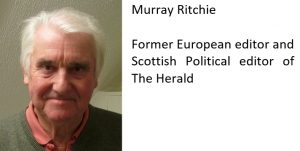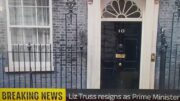Labour exults in Nicola Sturgeon’s departure, likewise the Tories. Labour has moved into second place according to the polls, but is still a distant second, Murray Ritchie writes.
It was all very odd. Nicola Sturgeon, giant of Scotland’s independence movement, stunned her country by stepping down as First Minister shortly after saying she had “plenty left in the tank”. Now Scottish politics are convulsed and heading who knows where?
We might have to wait for her memoirs to discover the truth of why Nicola Sturgeon quit. No-one really believed her when she said the “time was right” to step down, just after hinting that she would carry on.
Eight consecutive election victories and dealings with five UK prime ministers in her time as leader made her a giant of Scottish and UK politics. Inevitably, her shock exit left her party in chaos and furious that her husband, the party chief executive, had brazenly denied the truth of the SNP losing 30,000 members.
Nicola Sturgeon's husband Peter Murrell has been released without charge pending further investigation, Police Scotland said. They earlier confirmed a 58-year-old man was being held in custody in an investigation into the funding and finances of the SNP. https://t.co/JsviIpGgvw
— Chief-Exec.com (@Chief_Exec_com) April 6, 2023
Now her successor, the so-called “continuity candidate”, Humza Yousaf, has the job of uniting a party in turmoil – a party with a much-criticised record in governance.
True, it remains clearly the largest political party in Scotland, but the departing Ms Sturgeon has shaken loose many bricks and the structure has undeniably lost some stability.
There’s an echo of times past with today’s SNP divisions. Some independistas are prepared to bide their time while the nationwide Yes movement builds electoral support for Indyref2. The target seems to be a consistent 60 per cent plus at which point the UK simply cannot continue to block Scotland’s democratic aspirations.
And then there are those who want faster, more populist action but whose candidate in the contest for leader came a disappointing third out of three.
In SNP history this division was always a struggle between activists known as gradualists and fundamentalists. Before his fall from grace, Alex Salmond, Ms Sturgeon’s predecessor, won the argument for gradualism. She followed suit.
Fundamentalists had fewer arguments but more passion. When one was asked how a fundamentalist differed from the gradualist, he replied: “We just shout louder”.
But now gradualism has hit the buffers. Sure, it has won election after election and will probably continue to do so. But it has failed to win independence.
First, the UK Conservative government said No to Indyref2 and continues to do so. Then the UK Supreme Court ruled the Scottish Parliament had no power to call one.
This left the SNP facing a constitutional brick wall, and so far no way round it has been found.
Desire for independence does genuinely unite the SNP. It could be its electoral saviour yet again despite its dodgy record in government.
So Mr Yousaf has a big problem. Not only was he elected by a less than convincing majority of 52 per cent on a second ballot, but he is tortured by opposition claims of failure in his various ministerial posts to date.
His closest rival, Kate Forbes, won 48 per cent support in the party, suggesting she represents a significant critical faction for whom continuity is just what the SNP don’t need.
And polls show she was the choice of a majority of SNP voters while the parliamentary party preferred Mr Yousaf. The new FM’s first promise was to unite the party. All new leaders say that, of course
He was expected to offer the respected Ms Forbes high office. Instead he offered her a humiliating demotion which she promptly rejected. Hardly a master stroke for unity.
But desire for independence does genuinely unite the SNP. It could be its electoral saviour yet again despite its dodgy record in government. So Yousaf is at pains to shout his yearning for independence while quietly settling for the gradual Sturgeon approach.
His acceptance speech as party leader left independence to the end. If being patient means waiting five years for independence which is his timeframe for success, so be it.
But in the good music hall tradition of the big finish he left the audience with the rhetoric of indyref2 ringing in their ears on their way home.
Now the suddenly bewildered SNP is in new territory. For the first time in almost a decade it frets about the polls showing a drop in party support.
After the high of 55 per cent for independence last year polls now suggest the figure is back to 45 per cent which was where it finished in the 2014 referendum.
That’s enough to win elections but not independence. With general election support still ahead of the Unionist parties, the nationalists find themselves protected from their failures in health, education, and various social challenges, including shameful drug death numbers.
The new FM needs help. Unhappy activists say he should move the party closer to the general Yes movement which has no clear leadership but plenty of energy.
Sturgeon stood aloof from those flag-waving, kilted demonstrators who regularly take to the streets with their pipe bands and banners in all weathers. They seem to receive little SNP thanks for their efforts, with some senior party members finding them mildly embarrassing. Perhaps they might be invited to tea soon.
After the high of 55 per cent for independence last year polls now suggest the figure is back to 45 per cent which was where it finished in the 2014 referendum.
Naturally, Labour in Scotland exults in Sturgeon’s departure, likewise the Tories. Who wouldn’t when your nemesis simply walks away? Labour expects this lottery-style electoral windfall to harvest gains from the SNP at the general election next year. And well it might.
Labour has moved into second place in Scotland according to the polls, but it is still a distant second.
Sir Keir Starmer, UK Labour leader, has discovered a sudden love for Scotland and seems rarely to be away. He recalls the old rule of British politics that states Labour cannot win Westminster without Scotland where at present it enjoys one solitary MP.
Scottish Conservatives look like a busted flush. Polls suggest a near wipe-out in an election. One big comfort for the SNP is that any seats lost to Labour should be regained at the expense of the Tories.
But if there is a lesson to be learned from Ms Sturgeon’s strange departure, it is that from now on only a mug makes predictions in Scottish politics.
Editor’s note: The integrated tweet was been updated as latest news emerges.





